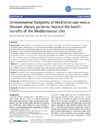Please use this identifier to cite or link to this item:
https://accedacris.ulpgc.es/jspui/handle/10553/19129
| Title: | Environmental footprints of Mediterranean versus Western dietary patterns: beyond the health benefits of the Mediterranean diet | Authors: | Saéz-Almendros, Sara Obrador, Biel Bach-Faig, Anna Serra-Majem, Lluis |
UNESCO Clasification: | 3206 Ciencias de la nutrición | Keywords: | Mediterranean diet Environmental footprints Western pattern Sustainable diets Spain, et al |
Issue Date: | 2013 | Journal: | Environmental Health: A Global Access Science Source | Abstract: | Background: Dietary patterns can substantially vary the resource consumption and environmental impact of a given population. Dietary changes such as the increased consumption of vegetables and reduced consumption of animal products reduce the environmental footprint and thus the use of natural resources. The adherence of a given population to the Mediterranean Dietary Pattern (MDP) through the consumption of the food proportions and composition defined in the new Mediterranean Diet pyramid can thus not only influence human health but also the environment. The aim of the study was to analyze the sustainability of the MDP in the context of the Spanish population in terms of greenhouse gas emissions, agricultural land use, energy consumption and water consumption. Furthermore, we aimed to compare the current Spanish diet with the Mediterranean Diet and in comparison with the western dietary pattern, exemplified by the U.S.A. food pattern, in terms of their corresponding environmental footprints.Methods: The environmental footprints of the dietary patterns studied were calculated from the dietary make-up of each dietary pattern, and specific environmental footprints of each food group. The dietary compositions were obtained from different sources, including food balance sheets and household consumption surveys. The specific environmental footprints of food groups were obtained from different available life-cycle assessments.Results: The adherence of the Spanish population to the MDP has a marked impact on all the environmental footprints studied. Increasing adherence to the MDP pattern in Spain will reduce greenhouse gas emissions (72%), land use (58%) and energy consumption (52%), and to a lower extent water consumption (33%). On the other hand, the adherence to a western dietary pattern implies an increase in all these descriptors of between 12% and 72%.Conclusions: The MDP is presented as not only a cultural model but also as a healthy and environmentally-friendly model, adherence to which, in Spain would have, a significant contribution to increasing the sustainability of food production and consumption systems in addition to the well-known benefits on public health. | URI: | https://accedacris.ulpgc.es/handle/10553/19129 | ISSN: | 1476-069X | DOI: | 10.1186/1476-069X-12-118 | Source: | Environmental Health: A Global Access Science Source [EISSN 1476-069X], v. 12 (1), Article number 118, (Diciembre 2013) | Rights: | by-nc-nd |
| Appears in Collections: | Artículos |
SCOPUSTM
Citations
218
checked on Jun 8, 2025
WEB OF SCIENCETM
Citations
202
checked on Jan 18, 2026
Page view(s)
272
checked on Jan 15, 2026
Download(s)
230
checked on Jan 15, 2026
Google ScholarTM
Check
Altmetric
Share
Export metadata
Items in accedaCRIS are protected by copyright, with all rights reserved, unless otherwise indicated.
